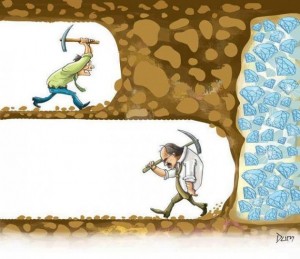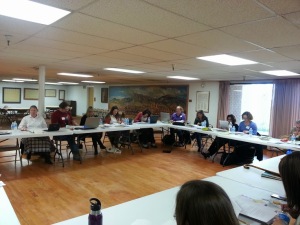It’s that time of year when people of all ages walk across the stage in cap and gown, ready to take the next step in their lives, whether it’s graduating up to first grade or getting a doctorate. My oldest daughter is graduating with a BA in History from Boise State in just a few weeks, so my mind is hyper focused on this transitional time.
There are some pieces of advice I’d like to pass on to graduates, but they really apply to everyone. They’re just kind of basic rules for living. I feel compelled to share these because so often, people don’t live by these rules and they are not the kind of people I want to be around. So here we go:
Rule #1:
Be nice to others. It’s pretty simple, but lost of many of us. Believe me, I have trouble with this one myself. People can be really irritating a lot of the time, so it’s tempting to want to lash out at them. But don’t. You never know what sort of position you’re going to be in during some future encounter with that person, and chances are they’ll remember if you weren’t nice. Even without such a self-serving reason, it’s just better for everyone if we could all abide by this simple rule. Treat others as you would like to be treated. This applies to small children, animals, coworkers, cashiers in training, and critique group partners.
The little unremembered acts of kindness and love are the best parts of a person’s life.
William Wordsworth 1770-1850, Poet
Rule #2:
Be generous. This is sort of an addendum to rule #1. Most of us have life pretty good. No, we’re probably not rich. I know I don’t drive fancy cars, but at least I have a car. And a home. And the things I need. There are so, so many people in this world, probably in our own neighborhoods, who don’t have a loving family, a warm home, a job, or a friend. Being generous doesn’t have to be monetary, although it certainly can be. It can also mean generous with one’s time and gifts.
Rule #3:
Be persistent. Nothing worth having comes easy, unless you won the lottery or something. Getting a book published requires persistence. So does getting a job. Finishing school. Making a relationship last. So many times in life, we feel like giving up. But you never know how close you might be to success, however you define that.

Don’t give up–you’re so close
Rule #4:
Learn to listen. Most of us think we listen, but we don’t. And that’s to our detriment. Listen to the life around you. Nature. Thunder. City sounds. The soft breathing of others. A puppy padding across the floor. But also listen when others talk. I read somewhere recently that studies show most people plan what they will say in response when someone else is talking, rather than truly listening. Imagine how much better we’d be at communicating if we didn’t do that.
Rule #5:
Be yourself. This is a message I proclaim over and over to the young people of today. I feel like they are brainwashed to fit into some societal mold. My Baby Boomer generation was conditioned to break the rules and live in the moment. I think you could do worse. The best, most successful, and happiest people (and I’m not talking about the likes of Oprah, Bill Gates, Lady Gaga, or President Obama, although they may well fit into this category, but not because they’re rich or famous) are living their lives by their own standards and following their own hearts. This may not apply to their job, but it applies somewhere. Which brings me to. . .
Rule #6:
There is more to life than your job. Hopefully most of us find work in a field that fulfills us and makes us smile when we wake up in the morning. Even if that is you, there is still more out there in this world than your paid employment. And this means we’re all on equal footing in our non-job hours. So don’t waste them, you know, sitting in your parents’ basement playing video games. Get out in the world and DO something. Talk to people. Hear their stories. Go outside of yourself. Pay attention. Find a place that needs your gifts, and give them. Volunteer. Mentor. Play. Seek.
Rule #7:
Never stop learning. It’s tempting after graduating to act like you’ve learned what you need. But I’ve got news for you–you haven’t even started yet. And that’s a good thing. Just remember that you don’t know it all, and you’ll be okay. Sure, maybe you studied leper colonies in India for a semester, but don’t pretend you’re some sort of expert. About that or anything else. You’re not. Keep learning. About the lepers, but also about everything else. Life is one giant learning lab, full of things that you never knew you didn’t know. Hunger for it. And be humble about what you may or may not know. Nobody likes a smug, arrogant, know-it-all.
Rule #8:
It is never too late to be what you might have been.
George Eliot (1819 – 1880) English Novelist
Life doesn’t end at graduation or [insert age here]. It’s not like now that you’ve graduated you have to be some boring version of yourself who works 9-5 and settles down with a mortgage and a car loan. If you want those things, great. If not, then do something else. Which leads me to. . .
Rule #9:
Don’t be afraid. To try new things. To laugh at yourself. To do things other people say can’t be done. To make a fool out of yourself. To have to work harder than you ever have before. To be creative. To be daring. Stop worrying and start doing.
And finally. . .
Rule #10:
Be honest. Live with integrity. No matter what you do, this will make your life better in every way. You can make up for lack of learned skills, making mistakes, and inexperience by being a person others can rely on and trust. If you make a mistake and own up to it, you can learn from it and become a better person. If you don’t know something and honestly seek to learn it, you will. If, instead, you are not honest with others or yourself, you live in the dark. Your life becomes dark. Honesty brings you into the light, where you can see what you need to see.





